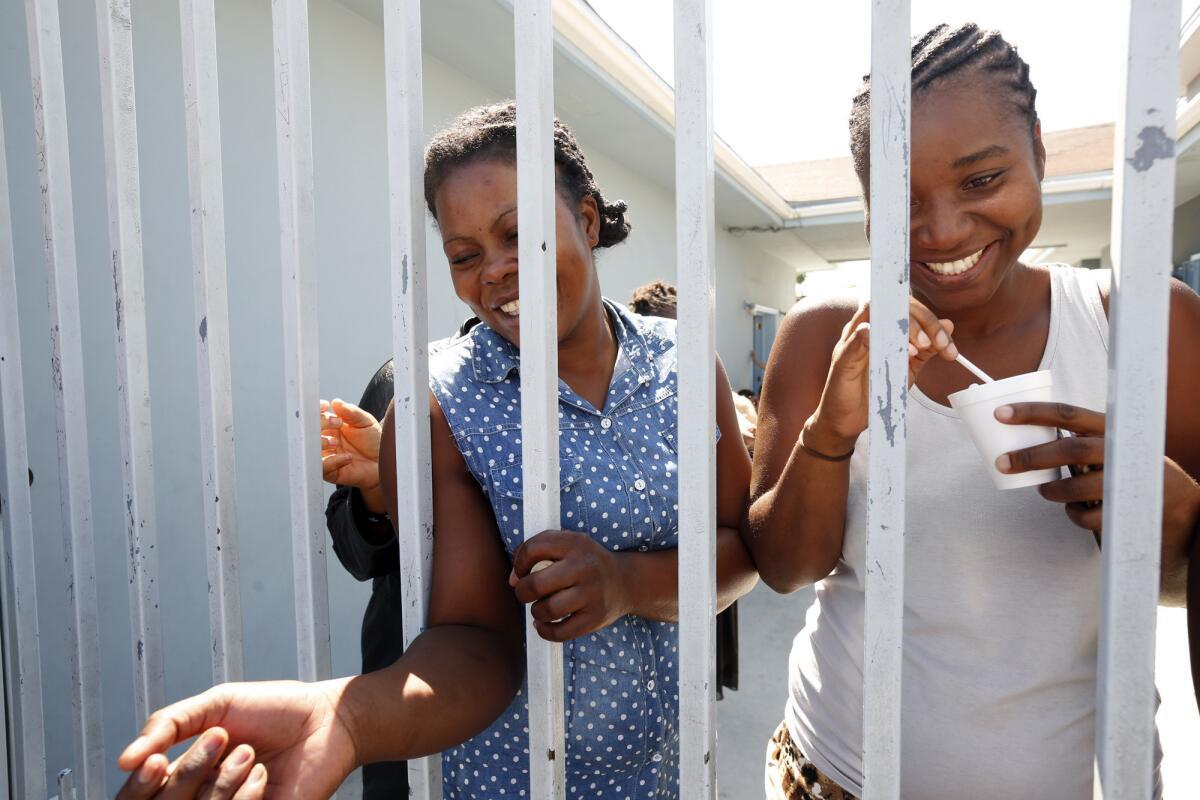Haitians gathered in Tijuana awaiting entry to U.S. now face likely deportation

- Share via
Reporting from TIJUANA — Hundreds of Haitians in Tijuana preparing to present themselves to U.S. officials at the San Ysidro Port of Entry face an unpleasant surprise: the probability of detention — and eventual deportation to their impoverished country — under a new policy by the U.S. Department of Homeland Security.
A day after the new policy went into effect, Haitian men who gathered in small groups on Friday morning outside the Padre Chava soup kitchen said they had heard nothing of the changes and asked anxiously for details.
“I don’t believe it,” Miterson Derisseau, a 25-year-old tile-setter from Port-au-Prince, said in French.
“Did Obama’s party decide this? He has a generous heart; he cannot deport us to our country,” added Derisseau, who hopes to join his sister in Boston.
Announced Thursday by Homeland Security Secretary Jeh Johnson, the new policy entails the resumption of regular, noncriminal deportations to Haiti, more than six years after these were suspended on the heels of the country’s devastating 2010 earthquake. Haitians without visas now face the same treatment as most foreigners who show up at the border without permission to enter the United States: detention and deportation, unless they express fear of persecution upon being sent back.
The changes have come on the heels of an unprecedented and unexpected flow of Haitians to the San Diego border, more than 4,346 in the first 11 months of the current fiscal year — out of a total of 4,844 nationwide. Last year’s total for San Diego was 315, while the national total was 795. The figures were released Friday by U.S. Customs and Border Protection.
In congressional testimony on Thursday in Washington, the director of U.S. Immigration and Customs Enforcement, Sarah Saldaña, called it “an emergency situation” and said she had learned of “40,000 Haitians who are en route to the United States,” through South and Central America.
Most of the Haitians in Tijuana have come by land from Brazil, where they moved after the 2010 earthquake to find work, but found survival increasingly difficult as the South American country has suffered a severe economic downturn.
The Haitians usually obtain safe passage through Mexico with a document called “oficio de salida” that allows them in the country for a limited time period, usually about 30 days, enough time to make it to the U.S. border.
Until Thursday, when the new policy went into effect, most Haitians presenting themselves at the San Diego border were allowed into the United States under humanitarian parole, and typically released with notices to appear before an immigration court at a later date.
But as of Thursday, the reception changed: Haitians seeking entry now are subject to a fast-track process called Expedited Removal that entails immediate detention.
It is unclear how soon the deportations to Haiti would take place, said Faye Hipsman, an analyst with the Washington-based Migration Policy Institute.
“The big factor is cooperation with Haiti,” Hipsman said. “My understanding is that this was a unilateral decision made by DHS,” she said, adding that the Haitian government has yet to publicly respond.
Until now, many Haitians have been traveling to established Haitian communities in New York City and Miami, where activists have been closely following news of the Haitians in Tijuana. Marleine Bastien, executive director of FAMN Haitian Women of Miami, was part of a group from Miami who came to the San Diego-Tijuana border recently to understand the situation.
“My heart really bleeds for them. I saw their faces. I saw their hope, such hope,” said Bastien, who has been collaborating with members of the San Diego Immigrant Rights Consortium.
Tijuana government officials have worked to distance themselves from the situation, privately stressing that the migrants are a federal matter, not a municipal one. Requests for interviews went unanswered this week.
As they have attempted to serve the rising numbers of Haitian migrants, Tijuana’s four main shelters have found themselves overwhelmed. Of 2,823 people receiving shelter at Padre Chava since May 27, a total of 1,831 have been Haitians, according to the center.
Near the U.S. border, at the Desayunador Salesiano Padre Chava, a shelter and soup kitchen, the news of the policy had yet to fully hit on Friday morning. And the few who had an inkling of the changes remained undeterred, said Margarita Andonaegui, the shelter’s administrator.
“Up to now, everyone has decided to go ahead” and keep their appointments with U.S. Customs and Border Protection at the San Ysidro Port of Entry. “Only one person asked me, ‘What do you recommend?’”
Dibble writes for the San Diego Union-Tribune.
ALSO
In Spain’s Tordesillas, Pelado the bull encounters both anger and pleasure tied to his fate
The Chinese space lab is about to crash and burn—and that’s OK with China
In hurry-up mode while Obama is president, 60 nations have agreed to global climate accord
Suscríbase al Kiosco Digital
Encuentre noticias sobre su comunidad, entretenimiento, eventos locales y todo lo que desea saber del mundo del deporte y de sus equipos preferidos.
Ocasionalmente, puede recibir contenido promocional del Los Angeles Times en Español.



